Israel-Hamas War: A Complex and Ongoing Conflict

Overview
The conflict between Israel and Hamas is a prolonged and deeply entrenched struggle that has roots in historical, political, and ideological differences. To understand the complexities of this conflict, one must delve into its historical background, the nature of the parties involved, and the impact on the civilian populations.
Historical Context
The origins of the Israel-Hamas conflict can be traced back to the broader Israeli-Palestinian conflict. After the creation of Israel in 1948, tensions between Israelis and Palestinians have persisted, marked by several wars, intifadas (uprisings), and peace processes. Hamas, an Islamist militant group, emerged from the Palestinian branch of the Muslim Brotherhood during the First Intifada in the late 1980s. Its charter calls for the establishment of an Islamic state in the historical territory of Palestine, and it has been involved in numerous violent confrontations with Israel.
Key Parties Involved
Israel: A democratic state established in 1948, Israel is a regional power with a strong military and technological infrastructure. Its government is characterized by a diverse political landscape but generally maintains a hardline stance against Hamas due to its history of attacks and its denial of Israel’s right to exist.
Hamas: A Palestinian militant group that controls the Gaza Strip. It is considered a terrorist organization by Israel, the United States, and the European Union, among others. Hamas operates both as a militant force and as a governing body in Gaza, providing social services and infrastructure to its supporters.
Recent Developments
The Israel-Hamas conflict has seen multiple escalations over the years, characterized by periods of intense fighting followed by temporary ceasefires. Each round of violence tends to follow a similar pattern: a flare-up of hostilities, often initiated by rocket attacks from Gaza and retaliatory strikes by Israel. The humanitarian impact on civilians in both Israel and Gaza has been severe, with casualties, destruction of infrastructure, and economic hardships affecting both sides.
Impact on Civilians
The impact of the conflict on civilians is profound. In Gaza, residents face frequent shortages of essential supplies like food, medicine, and electricity. The destruction of homes and infrastructure further exacerbates the humanitarian crisis. In Israel, rocket attacks from Gaza target civilian areas, causing loss of life and property damage, and instilling a sense of insecurity among the population.
International Reactions
The international community has often been divided in its response to the conflict. While there are calls for peace and negotiations, countries and organizations vary in their support for either side. The United Nations and various humanitarian groups frequently call for ceasefires and increased aid to affected populations.
Conclusion
The Israel-Hamas conflict remains one of the most intractable conflicts in modern history. Its roots are deep, and the issues involved are multifaceted, encompassing territorial disputes, historical grievances, and political ideologies. Both sides have suffered greatly, and while temporary ceasefires and peace efforts have occurred, a lasting resolution remains elusive. The international community continues to seek ways to mediate and alleviate the suffering of those caught in the crossfire.
FAQs
1. What are the primary causes of the Israel-Hamas conflict?
- The conflict is driven by historical grievances, territorial disputes, and differing political and ideological goals. Hamas’s charter calls for the elimination of Israel, while Israel seeks security and recognition.
2. How has the international community responded to the conflict?
- Responses have varied, with some countries and organizations supporting Israel’s right to self-defense and others condemning its military actions. There are also calls for humanitarian aid and ceasefire agreements.
3. What is the humanitarian situation in Gaza?
- Gaza faces severe humanitarian issues, including shortages of food, medicine, and electricity. The blockade and repeated military conflicts have exacerbated these problems.
4. How does the conflict affect Israeli civilians?
- Israeli civilians face threats from rocket attacks, which cause casualties and property damage. The ongoing security concerns contribute to a pervasive sense of instability.
5. Are there any ongoing peace efforts?
- There have been numerous peace initiatives and ceasefire agreements over the years. However, a lasting resolution has been elusive due to the deep-seated issues and lack of trust between the parties.


Blue Techker I truly appreciate your technique of writing a blog. I added it to my bookmark site list and will